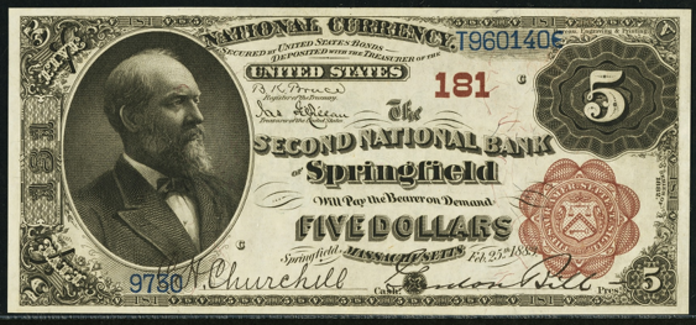Five Dollar Notes › Nationals › 1882 Five Dollar National Bank Notes › Pennsylvania Charters › 1882 $5 Brownsville Pennsylvania Monongahela National Bank
Get Value Now
| Item | Info |
|---|---|
| Series | 1882 |
| Charter | #648 Monongahela National Bank of Brownsville, Pennsylvania |
| Year Chartered | 1864, 503 Banks Chartered |
| City Info | Brownsville is a borough in Fayette County, Pennsylvania, United States, first settled in 1785 as the site of a trading post a few years after the pacification of the Iroquois enabled a post-Revolutionary war resumption of westward migration. The Trading Post soon became a tavern and Inn, and was soon receiving emigrants heading west as it was located above the cut bank overlooking first ford that could be reached to those descending from the Mountains Brownsville is located 40 miles south of Pittsburgh along the east bank of the Monongahela River, and until the 1850s steel boom—because it sat atop the first water routes west—eclipsed Pittsburgh in importance, size and population. Source: Wikipedia |
| Similar Cities | If your note doesn't match try: 1. Brownsville, Pennsylvania - First National Bank 2. Brownsville, Pennsylvania - National Deposit Bank 3. Brownsville, Pennsylvania - Second National Bank 4. Brownsville, Tennessee - First National Bank |
| Seal Varieties | Brown, Blue |
| See Also | If your note doesn't match try: 1. 1878 $5 Legal Tender 2. 1880 $5 Legal Tender 3. 1886 $5 Silver Certificates |
| Other Info | 1. Value depends on notes known for charter, condition and market demand. |
| Neat Fact | Brown Backs issued in sheets of 4 $5 Notes (Friedbergs, 20th Ed. P111) |
No Obligations Offers and Appraisals
Please submit a good photo or scan. It will be identified and evaluated. Understand there may be subtle differences between the image you see above and your note. Signatures, design, markings and note condition will determine the offer price. Notes in Uncirculated or better condition receive the best offers.
Appraisals can be estimated for wholesale and retail prices. Wholesale is what dealers typically pay. Retail is what a collector might pay. Retail is slightly higher in most cases.
Please visit this page for USA Paper Money Reference. Do not treat this page as a reference guide, it is for appraisal and acquisition purposes only.
